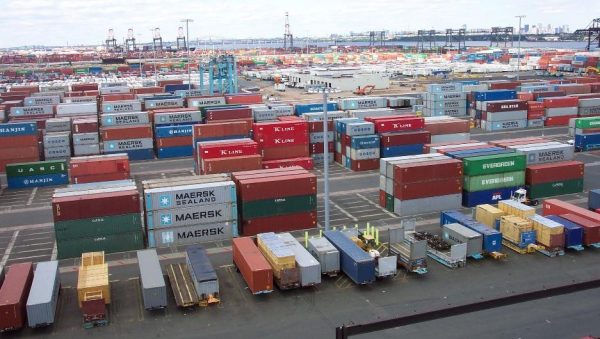Import bills, supply chain disruptions to spike inflation further

• Scholars recommend applied growth solution to curb Nigeria’s drift
Nigerians may have to brace for tougher times earlier declared by the nation’s economic managers, once the lockdown is relaxed, as the realities of global supply chain disruptions, pressure on Naira as a result of demand for foreign exchange for the importation of petrol, food and other commodities are expected to further spike inflationary trend.
For the seventh consecutive month, Nigeria’s headline inflation rose at a faster pace, expanding by six basis points in March 2020 to 12.26 per cent year-on-year (February: 12.20 per cent y/y), representing the highest level of price growth since April 2018.
On a month-on-month (m/m) basis, the headline inflation increased slightly by five basis points to 0.84 per cent.
According to the National Bureau of Statistics (NBS), the lock down in Abuja, Lagos and Ogun states and various major disruptions in normal economic activity in several states that started in April 2020, could not have had any major impact on March 2020 Inflation.
However, with the removal of subsidy, disruptions in global supply chains as a result of the raging pandemic, fall in oil prices, leading to drastic drop in government revenues, industry observers expect further rise in inflation in the months to come.
With food inflation rising to 14.98 per cent y/y in the review period, analysts at Cordros Capital believe the frontloading of major food items that preceded the lockdown must have negatively influenced the food basket.
Specifically, the rise was caused by increases in prices of Bread and Cereals, Fish, Potatoes, Yam and other tubers, Oils and fats, Vegetables, and Fruits. Compared to February 2020, food inflation expanded by seven basis points to 0.94 per cent m/m.
Already, the Association of Master Bakers and Caterers of Nigeria (AMBCN) are raising concerns about the proposed hike in price of flour by operators, as a result of the review in exchange rates by the Central Bank of Nigeria.
With the proposed increase, the prices of bread and other pastries and flour-based product are expected to rise in the months to come, spiking food inflation.
To check inflation and other disruptions to the economy, the Lagos Chamber of Commerce and Industry (LCCI), urged firms to adopt a flexible business model to ensure tight control on costs and non-revenue generating segments of the business, and also review supply chain by focusing on import substitution and backward integration as much as possible.
On month-on-month basis, the core sub-index increased by 0.80 percent in March 2020. This was up by 0.07 percent when compared with 0.73 percent recorded in February 2020.
The highest increases were recorded in prices of Passenger transport by air, Tobacco, Household textiles, Major household appliances, Domestic services and household services, Pharmaceutical products, Maintenance and repair of personal transport equipment, Water supply and Catering services.
Meanwhile, as the economy grapples with the rising inflation, a concerned group of Nigerian scholars have said Nigeria should not expect a reversal in the growth drift except the country implements what it calls alternative development strategy.
The Group’s recommendation is contained in an Advocacy Position Paper to the Vice President, Prof. Yemi Osinbajo-led Economic Sustainability Committee, set up by the Federal Government to seek for solution to abate economic drift in Nigerian.
In the paper exclusively obtained by The Guardian, yesterday, in Abuja, the Group called for a new development strategy because of the belief that unconventional solutions to big economy problems are not produced by economics, but by collective wisdom of gifted thinkers and intellectual capacity, which will jointly usher the economy into a new growth height that is sustainable which then restores real peace and inclusive prosperity in the country.
The Coalition said: “We must open our knowledge space to new knowledge, just like the US did during the Great Depression. What our dear country Nigeria needs now to end this complicated economic crises is a Fortified Version of Alternative to the orthodox development concept called Applied Growth Solution (AGS); and it must be adopted through broad national engagement that will involve five levels of stakeholder communities.”
On month-on-month basis, the Headline index increased by 0.84 percent in March 2020. This is 0.05 percent higher than the rate recorded in February 2020 (0.79 percent).
The percentage change in the average composite CPI for the twelve months period ending March 2020, over the average CPI for the previous twelve months period was 11.62 percent, showing 0.08 percent point from 11.54 percent recorded in February 2020.
The urban inflation rate increased by 12.93 percent (year-on-year) in March 2020 from 12.85 percent recorded in February 2020, while the rural inflation rate increased by 11.64 percent in March 2020 from 11.61 percent in February 2020.
On a month-on-month basis, the urban index rose by 0.88 percent in March 2020, up by 0.06 from 0.82 percent recorded in February 2020, while the rural index also rose by 0.80 percent in March 2020, up by 0.04 points from the rate recorded in February 2020 (0.76percent).
The corresponding twelve-month year-on-year average percentage change for the urban index was 12.15 percent in March 2020 (this is higher than 12.03 percent reported in February 2020), while the corresponding rural inflation rate in March 2020 was 11.14 percent compared to 11.09 percent recorded in February 2020.
The “All items less farm produce” or Core inflation, which excludes the prices of volatile agricultural produce stood at 9.73 percent in March 2020, up by 0.3 percent when compared with 9.43 percent recorded in February 2020. The average 12-month annual rate of change of the index was 9.11 percent for the twelve-month period ending March 2020. This is 0.02 percent points higher than 9.09 percent recorded in February 2020.







